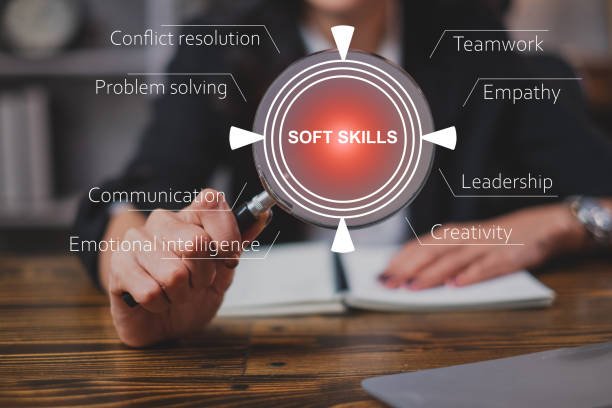In today’s technology-driven world, developers are often known for their coding ability. But did you know that 85% of job success stems from well-developed soft skills, according to research from Harvard University? While technical expertise gets you in the door, it’s the ability to collaborate, communicate, and adapt that propels careers forward. As AI reshapes the industry, soft skills are becoming even more critical, helping developers stand out in competitive job markets and drive innovation.
Why? Because software isn’t built in a vacuum. It’s created in teams, tested by users, and delivered to clients. That means the way you communicate, collaborate, adapt, and solve problems has just as much impact on your success as your knowledge of Python or React.
In this article, we’ll explore the importance of soft skills in software development, which soft skills every developer needs, and how they can truly boost your career. By the end, you’ll see why coders need emotional intelligence just as much as clean code.
What are Soft Skills for Developers?
Let’s clear this up first: soft skills are the human skills—how you think, interact, and collaborate. They differ from technical skills (such as mastering C++, debugging, or building APIs).

Concept of Soft skills talent. Job hiring and career search for. Self-motivation, development, improvement, and achievement. Soft skill strategy ability analysis. Growth mindset of an employee. Team work
Think of it this way:
- Technical skills = the “what” (your ability to code, design, test).
- Soft skills = the “how” (your ability to work with people and solve problems).
Essential Soft Skills for Programmers
A quick rundown of the top soft skills every developer needs:
- Communication skills for developers – Explaining technical ideas in plain English. Example: making sure the marketing team actually understands what “API integration” means.
- Teamwork skills in programming – Pair programming, agile sprints, or even handling merge conflicts without causing real conflicts.
- Problem-solving skills for devs – Looking beyond code errors and tackling root causes creatively.
- Adaptability – Tech moves fast. New frameworks pop up daily. Adaptability keeps you relevant.
- Emotional intelligence – Understanding your own reactions and empathizing with teammates (especially when deadlines loom).
Quick Example: A dev who communicates clearly can save weeks of rework by aligning project goals early.
The Importance of Soft Skills in Software Development
The truth: projects succeed or fail based on people, not just code. That’s why soft skills are critical in software development.
Why Soft Skills Matter in Real Life
- Agile teams rely on communication and teamwork. Daily stand-ups aren’t just status updates—they’re about collaboration.
- Client interactions often decide whether a project gets approved or delayed. Developers who explain solutions in non-technical language are game-changers.
- Problem-solving skills for devs drive innovation. Sometimes, the best solution isn’t the most complex one but the most practical.
Benefits of Soft Skills for Software Engineers
- Better collaboration = fewer misunderstandings.
- Faster promotions = leadership skills in tech careers often weigh more than raw coding speed.
- Less burnout = emotional intelligence helps manage stress and workload.
- A higher project success rate is achieved when developers listen and adapt, keeping projects on track.
Mini Case Study: Atlassian reported that its best-performing dev teams weren’t the ones with the “smartest coders,” but those with the strongest teamwork and communication skills.
How Soft Skills Boost Developer Success
Where things get interesting: Soft skills don’t just make you easier to work with—they directly impact your career progression and income.
According to Harvard Business Review, developers with strong interpersonal and leadership skills earn 20% more on average.
Communication: Bridging the Gap
Ever had a project derailed because developers and non-tech teams weren’t on the same page? Strong communication bridges that gap. You become the “translator” between code and business needs.
Adaptability: Thriving in Chaos
New framework released? Client changed requirements mid-sprint? Adaptable developers don’t panic—they pivot. That’s why adaptability is one of the most essential soft skills for programmers today.
Leadership: Beyond Just Coding
Even if you don’t have “manager” in your title, leadership matters. Leading a sprint, mentoring juniors, or stepping up during a crisis shows you’re more than just a coder—you’re a problem-solver and decision-maker.
Quick Stat: A Stack Overflow survey found that developers with leadership and collaboration skills reported higher career satisfaction.
Developing Soft Skills as a Programmer
Okay, so how do you actually develop soft skills as a programmer? Here’s the good news: unlike memorizing syntax, soft skills grow with practice.
Practical Tips to Build Soft Skills
- Take workshops or online courses – Platforms like Coursera or Udemy offer soft skills training for IT professionals.
- Practice pair programming – Great for improving teamwork and communication.
- Ask for feedback – Regular peer reviews aren’t just for code.
- Read books – “Emotional Intelligence” by Daniel Goleman is a must-read.
- Join communities – Open-source projects or dev forums build collaboration skills.
Overcoming Common Challenges
Many coders are introverts. That’s not a weakness—it’s just a starting point. You don’t need to be the loudest in the room. Instead, focus on listening actively, asking thoughtful questions, and contributing steadily in team discussions.
Pro Tip: Keep a “soft skills journal.” After meetings, note what went well and what you can improve (e.g., “I explained my point clearly” or “I interrupted too often”).
Technical vs Soft Skills for Coders: Finding Balance
The age-old debate: Technical vs. Soft Skills for Coders. Which matters more?
Truth is, they’re not in competition. You need both. Think of them as two sides of the same coin:
- Technical skills → let you build great products.
- Soft skills → help you deliver those products successfully.
Myths to Debunk
- Myth 1: “Coders don’t need people skills.”
- Truth: Even solo freelancers need to talk to clients, negotiate rates, and explain deliverables.
- Myth 2: “AI will replace developers.”
- Truth: AI can generate code, but it can’t empathize, negotiate, or adapt. That’s where human soft skills are irreplaceable.
In 2025, AI’s rise makes human skills irreplaceable—machines can’t empathize or lead ethically. Balancing both ensures long-term relevance, as seen in developers earning premiums for soft skills.
Future Outlook
As automation takes over repetitive coding tasks, the developers who thrive will be the ones who bring creativity, leadership, and emotional intelligence to the table.
FAQ: Why Soft Skills Matter for Developers
What are soft skills for developers?
Soft skills for developers refer to interpersonal and behavioral abilities that complement technical expertise. Unlike hard skills like coding languages, soft skills include communication, teamwork, problem-solving, adaptability, and emotional intelligence. These essential soft skills for programmers help in collaborating effectively and navigating real-world challenges in tech environments.
Why do developers need soft skills?
Developers need soft skills because the tech industry demands more than just code—it’s about teamwork, innovation, and client satisfaction. The importance of soft skills in software development is evident in agile teams, where poor communication can lead to project failures. Studies show that 85% of job success comes from soft skills, making them crucial for career advancement and handling complex, human-centered problems.
How do soft skills boost developer success?
Soft skills boost developer success by enhancing collaboration, leading to faster project delivery and higher earnings—up to 20% more for those proficient in them. For instance, leadership skills in tech careers open doors to management roles, while communication skills for developers improve cross-team interactions. Overall, they provide a competitive edge in a field where AI handles routine tasks, leaving human skills irreplaceable.
What is the difference between technical vs soft skills for coders?
Technical skills for coders involve tools like programming languages and algorithms—the “how” of building software. Soft skills, on the other hand, focus on the “who” and “why,” such as problem-solving skills for devs or teamwork skills in programming. Finding balance is key; technical expertise gets you hired, but soft skills ensure long-term growth and adaptability in fast-evolving tech landscapes.
How can I start developing soft skills as a programmer?
Developing soft skills as a programmer starts with self-assessment and practice. Join workshops on platforms like LinkedIn Learning, engage in pair programming for teamwork, or read books like “Soft Skills: The Software Developer’s Life Manual.” Daily habits, such as active listening or feedback sessions, can help. Soft skills training for IT professionals, including online courses, accelerates improvement without requiring extensive time away from coding.
Why do coders need emotional intelligence?
Coders need emotional intelligence to manage stress, empathize with team members, and resolve conflicts effectively. In high-pressure environments, it prevents burnout and fosters innovation. For example, understanding team dynamics can lead to better code reviews and collaborative debugging, highlighting why soft skills matter for developers in building resilient, high-performing teams.
Are soft skills more important than technical skills in programming?
No single set is more important—it’s about balance. While technical skills are foundational, the benefits of soft skills for software engineers shine in real-world applications, like client pitches or team leadership. As AI automates coding, soft skills become differentiators, with 92% of hiring managers prioritizing them equally or more.
Conclusion: Embrace Soft Skills for Long-Term Tech Success
At the end of the day, being a developer isn’t just about writing clean code—it’s about building products that work, with people you enjoy working with.
The benefits of soft skills for software engineers are substantial: improved teamwork, faster career progression, reduced stress, and greater impact. Whether it’s communication, problem-solving, or emotional intelligence, these are the real career accelerators.
So ask yourself: Am I just a coder, or am I becoming a well-rounded professional?
Start today. Join a workshop, volunteer to lead a sprint, or listen more during your next stand-up. Small steps compound into big changes.
Because in the end, why coders need emotional intelligence is simple: even the best code won’t matter if you can’t connect, collaborate, and lead.





Add comment